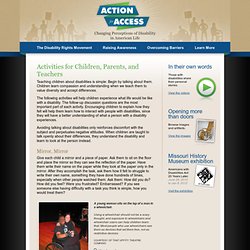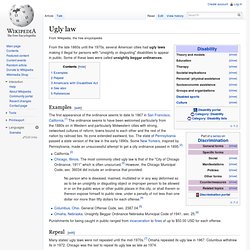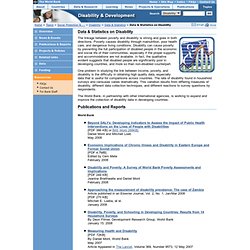

Action for Access - Changing Perceptions of Disability in American Life. Teaching children about disabilities is simple: Begin by talking about them.

Children learn compassion and understanding when we teach them to value diversity and accept differences. The following activities will help children experience what life would be like with a disability. The follow-up discussion questions are the most important part of each activity. Encouraging children to explain how they felt will help them learn how to interact with people with disabilities, since they will have a better understanding of what a person with a disability experiences. Avoiding talking about disabilities only reinforces discomfort with the subject and perpetuates negative attitudes. Lesson 1: Getting To Know People with Physical Disabilities (Grades K – 2) Ugly law. From the late 1860s until the 1970s, several American cities had ugly laws making it illegal for persons with "unsightly or disgusting" disabilities to appear in public.

Some of these laws were called unsightly beggar ordinances. Examples[edit] The first appearance of the ordinance seems to date to 1867 in San Francisco, California.[1] The ordinance seems to have been welcomed particularly from the 1880s on in Western and particularly Midwestern cities with strong, networked cultures of reform, towns bound to each other and the rest of the nation by railroad ties. Its zone extended eastward, too. The state of Pennsylvania passed a state version of the law in the early 1890s. Lessons/Activities-Awareness of Disabilities. Bead jewelry, shea butter, beaded jewelry, beading, BeadParty. Disability - Data & Statistics on Disability. The linkage between poverty and disability is strong and goes in both directions.

Poverty causes disability through malnutrition, poor health care, and dangerous living conditions. Disability can cause poverty by preventing the full participation of disabled people in the economic and social life of their communities, especially if the proper supports and accommodations are not available. In fact, the qualitative evident suggests that disabled people are significantly poor in developing countries, and more so than non-disabled counterpart. One problem in studying the link between income, poverty, and disability is the difficulty in obtaining high quality data, especially data that is useful for comparisons across countries. Asha for Education: Project Category Admin.